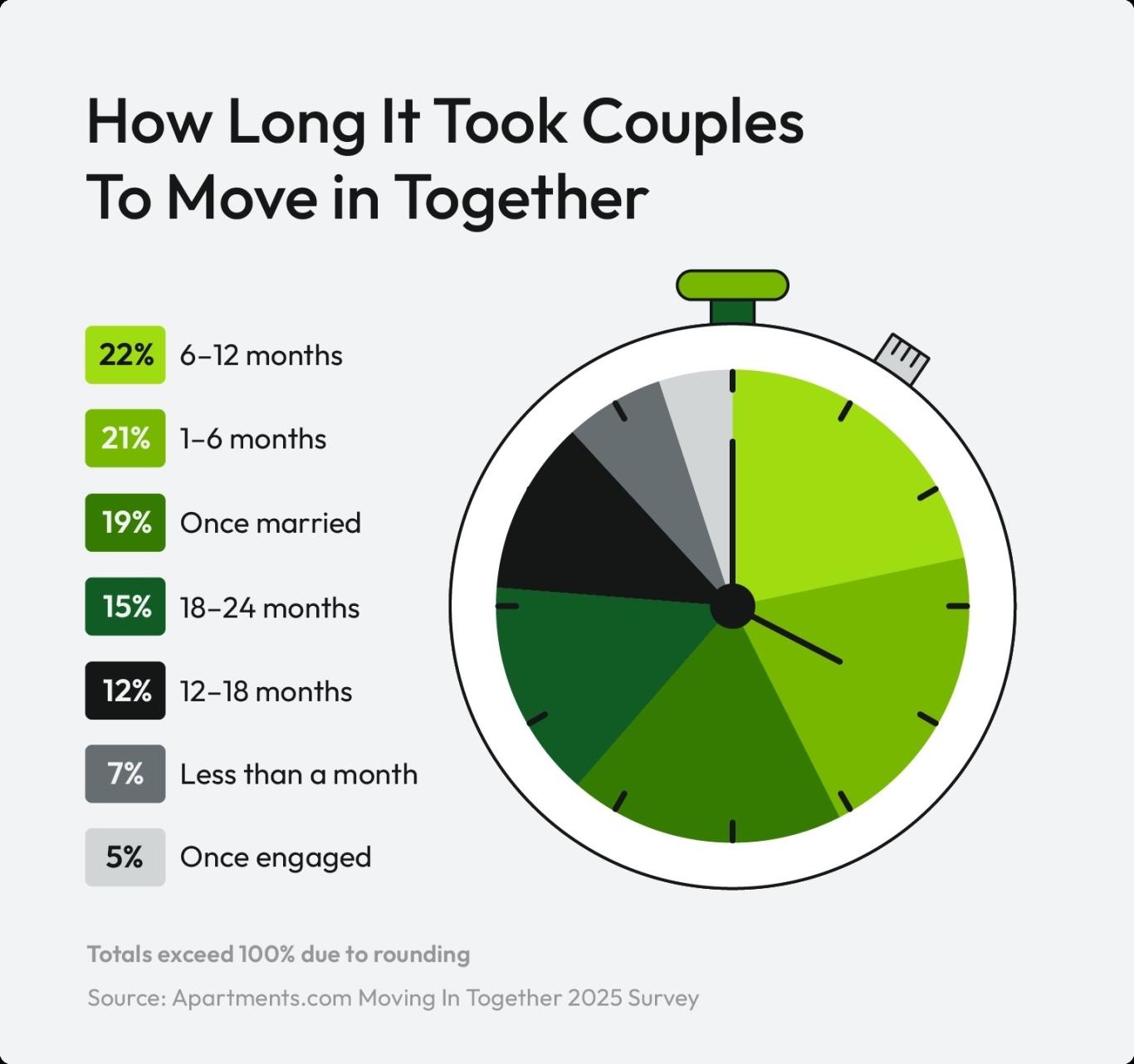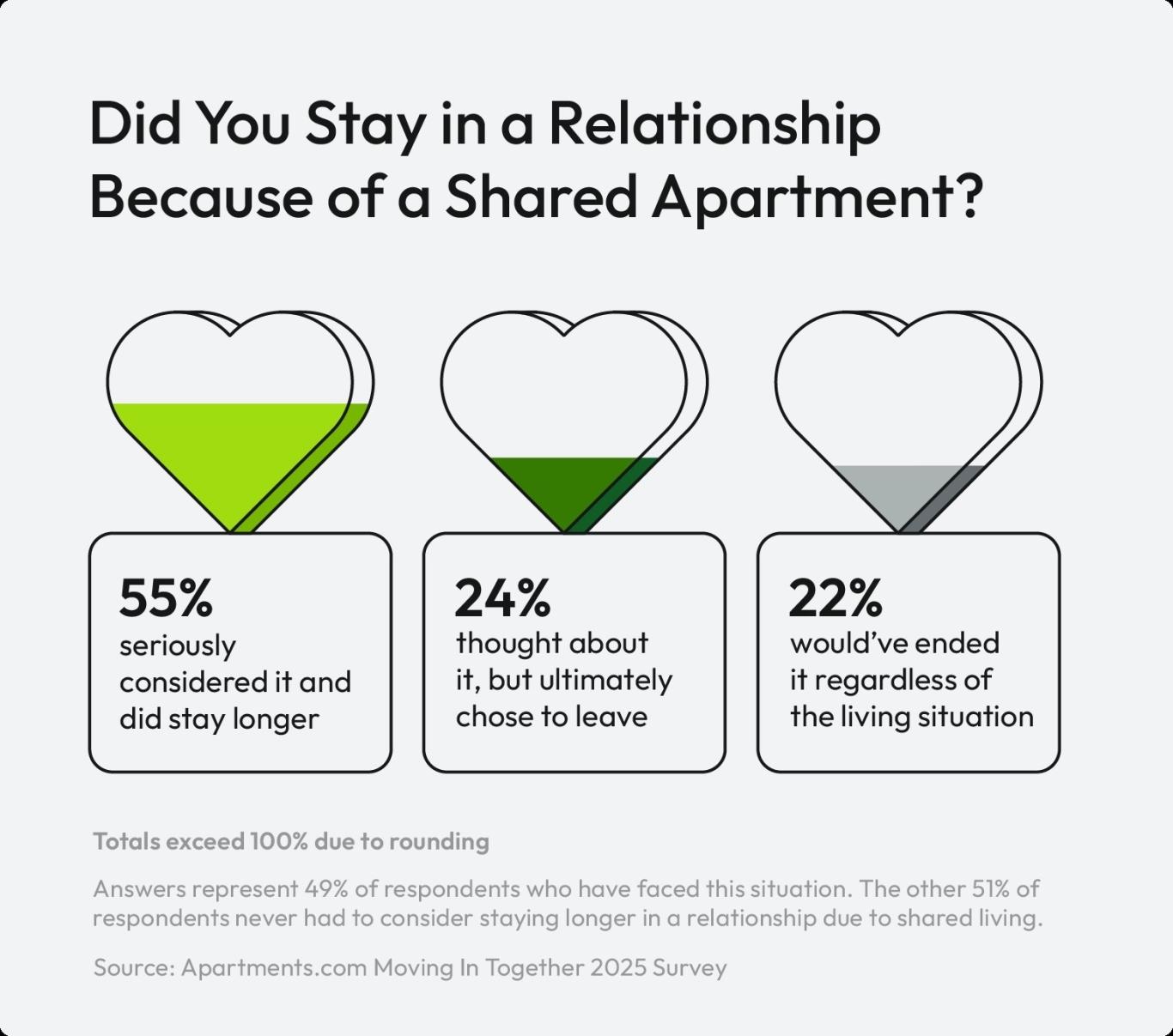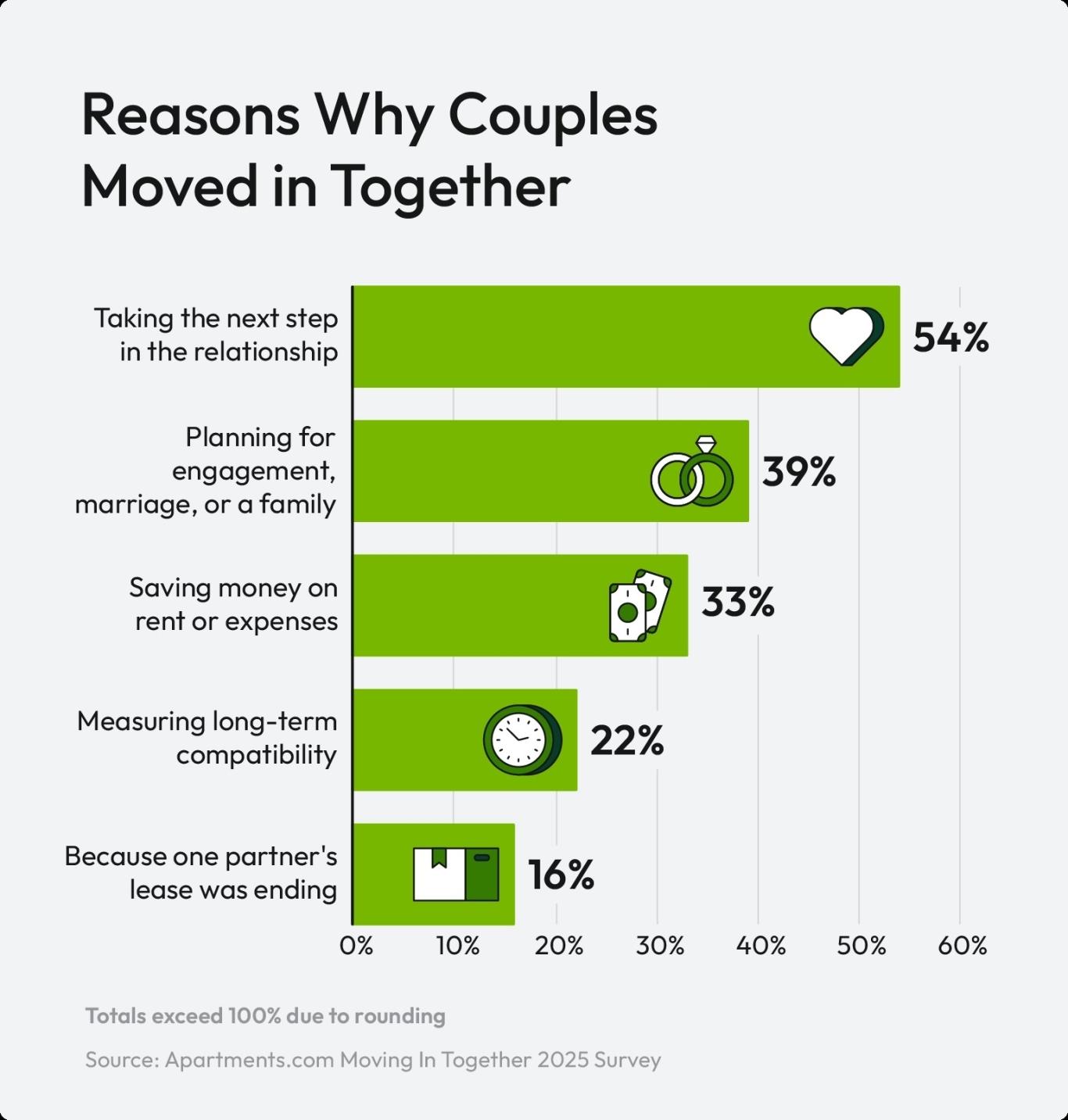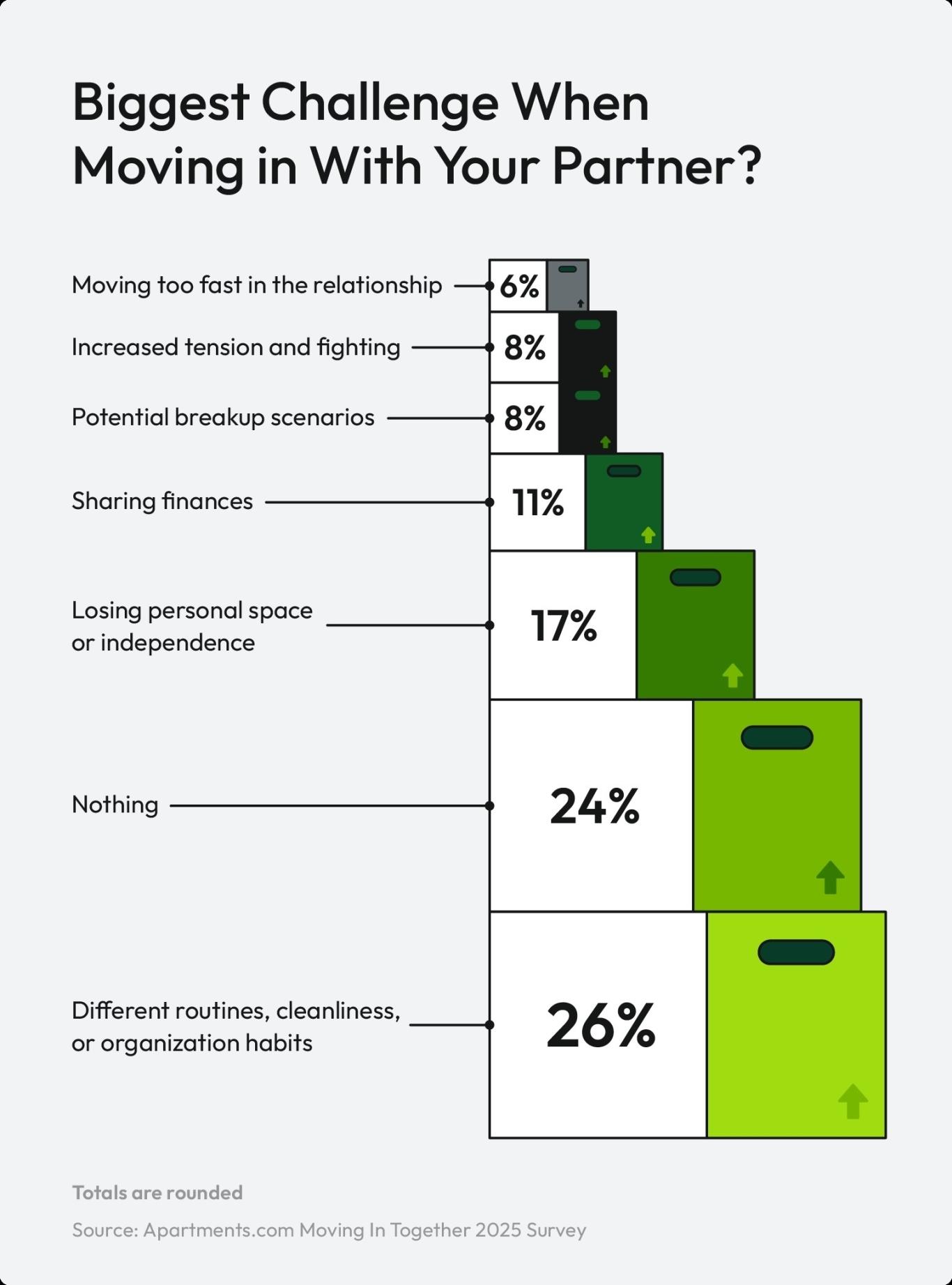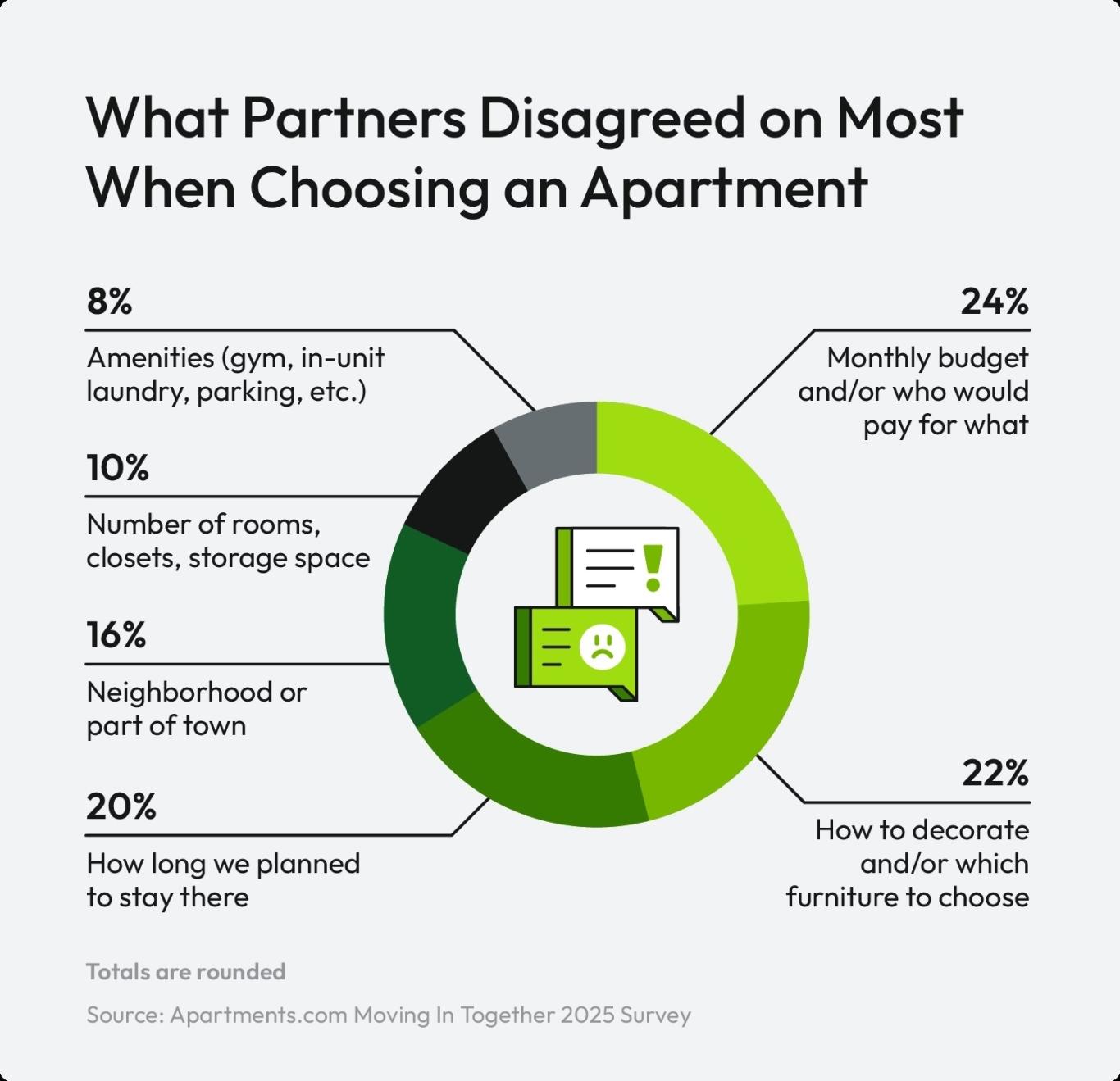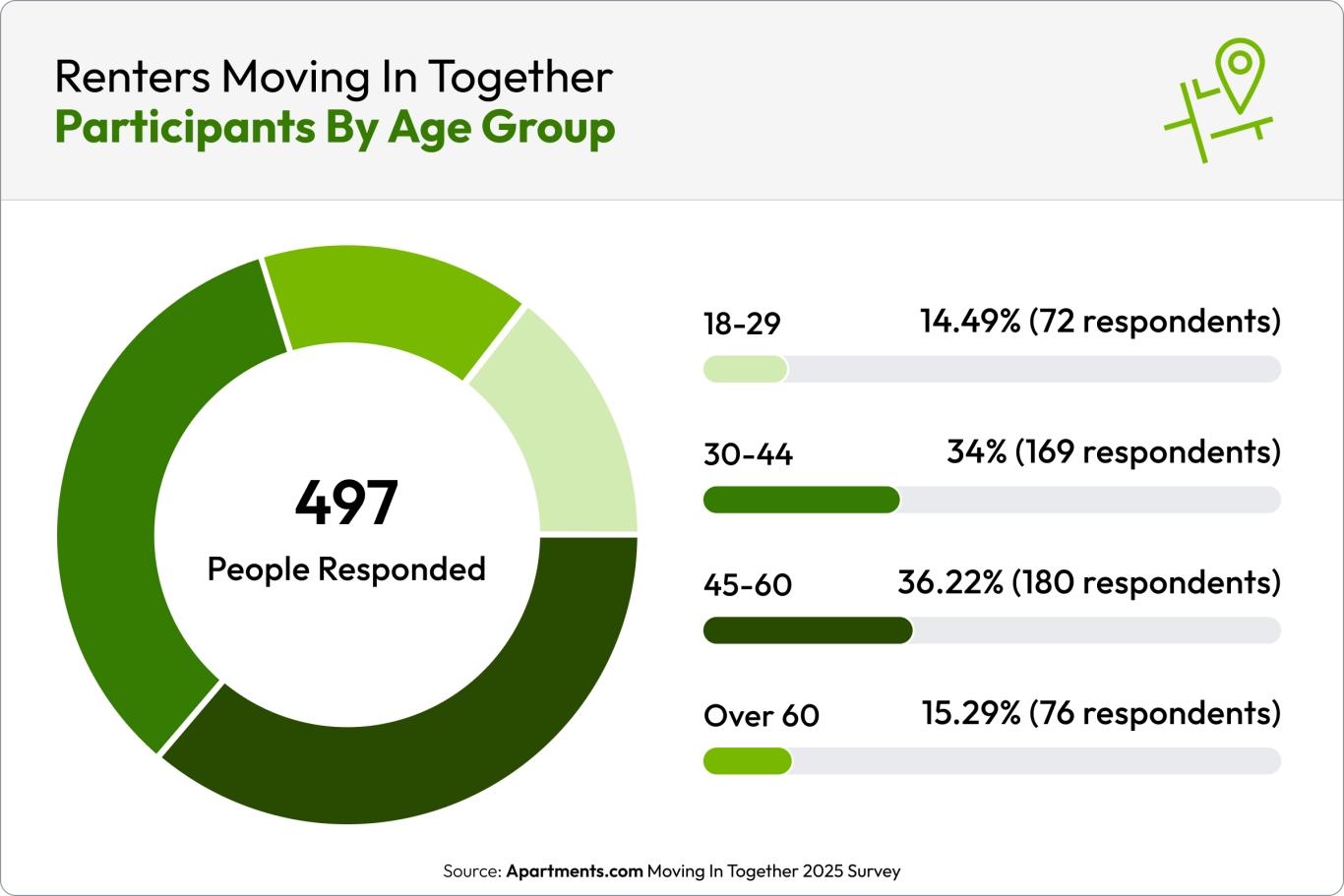Moving in with your romantic partner marks a milestone moment in your relationship. It’s also the beginning of a rollercoaster-like journey filled with excitement, concern, and compromise. Moving in too soon, for the wrong reasons, or before having some serious conversations can cause irreparable damage to your relationship.
At Apartments.com, we understand that finding the right space is more than just square footage; it's about finding a place to build a life together. That's why we surveyed renters living with their romantic partner to understand when, why, and what concerns they had when moving in together, so you can experience a smoother transition when it’s time to take the next step in your relationship.
A few of our findings even show how younger Americans have different motivations for moving in with their partner than the overall population. Discover what current renters in relationships had to say about moving in together, with fascinating findings on the complex interplay of love, logic, and a little bit of lease-induced loyalty — so you can make an informed decision about your relationship and living situation.
Key Takeaways
- Quick cohabitation: Over one-quarter of surveyed couples moved in together within the first six months of their relationship.
- Locked in for love or a lease: Of the individuals who’ve chosen between ending a relationship or staying longer only because of a shared living situation, 55% stayed longer in their relationship.
- Love and logic: 33 percent of couples chose to move in together to save money on rent, while 54 percent did so to progress their relationship.
- The money issue: A third of renters moved in with their partner to save money, but almost a quarter also say finances were their biggest disagreement.
- Gen Z’s unique concerns: Younger generations are 6 percent more concerned about increased fighting or tension in the relationship and 7 percent less concerned about losing personal space or independence after moving in together than the general population.
The Fast Track to Cohabitation: Why Modern Couples Move in Fast
Couples are bypassing traditional, lengthy courtship before sharing an apartment. Remarkably, 28 percent of couples moved in together within the first six months. Then, another half of the couples surveyed moved in together within the first year of their relationship.
Deciding when to move in together will vary from couple to couple. However, this trend to move quickly is likely a multifaceted decision driven by several factors, including cost savings on everyday expenses, more time together with deeper intimacy, and the undeniable pressure of today's escalating rental costs.
However, moving in too quickly gives you less time to fully understand your partner's long-term habits, financial discipline, or conflict resolution styles, possibly leading to significant issues or unexpected financial strain. This is even true when thinking about why newlyweds should rent, since apartment living provides a valuable period of financial and relational flexibility during a significant life transition.
At the same time, if moving in together quickly makes sense for your joint wants and needs, you’re certainly not alone. If you do find yourself among the half of couples taking this step early on in your relationship, it’s critical to:
- Find an apartment that offers comfort and flexibility: A comfortable living space minimizes external stressors and allows a couple to focus on adapting to each other's habits and routines. A flexible apartment might mean it's easier to sublet an extra bedroom if needed financially, or that there’s extra space for one person to live if the relationship ends.
- Search for a shorter-term lease that allows for potential changes in circumstances: If a couple moves in together early and signs a 12-month lease and ends the relationship after two months, they’re both legally and financially obligated for the remaining ten months. Breaking a lease can lead to significant penalties, loss of security deposit, and damage to credit scores.
- Make sure both of your names are on the lease: If there’s a breakup, having both names on the lease provides a clear legal framework for how the lease will be handled, potentially simplifying the process of one person moving out or the lease being broken.
Are Shared Apartments Prolonging Unhappy Relationships?
Living with your significant other should be a happy decision that helps to strengthen your relationship. In reality, the complex truth is that a shared apartment can prolong a relationship past its expiration date and make ending things complicated.
Almost half of the individuals surveyed (49 percent) have faced the question of whether they should stay in a relationship longer solely because they live together. Surprisingly, of those who have faced this choice, 55 percent did stay longer in a relationship only because of a shared living situation.
Leaving a long-term relationship is emotionally challenging in the best of cases, but breaking up while living together adds another complicated layer. A shared lease, the cost of living, and the process of finding a new apartment can prevent individuals from leaving an unfulfilling or even detrimental relationship. This finding demonstrates how significantly where you live can shape your freedom and decision-making beyond just comfort or commute.
While you may be in the honeymoon phase when moving in together, it's important to prepare for every outcome, even the difficult ones, to protect yourself in the case of an eventual breakup. To help navigate a breakup with a joint lease, you need to prepare for the worst before even signing the lease by:
- Looking for apartments that offer flexible lease terms: A shorter lease provides a natural check-in point. If things are going great, you can renew for a longer term. If there are unforeseen challenges, you have an easier out without the pressure of a long lease.
-
Touring apartments that have multiple bedrooms: If the relationship ends, an extra bedroom can ease the transition by allowing one partner to temporarily move into the second bedroom while figuring out their next steps. This can reduce stress and allow for a more amicable separation.
-
Making sure both of your names are on the lease: Ensures that both individuals have legal tenant rights, and you cannot be evicted by your former partner immediately after a breakup.
Love vs. Logic: Both Win for Couples Deciding to Live Together
Love still rules as the reason why couples move in together. Over one-half (54 percent) of couples chose to move in together to take the next step, with an additional 39 percent moving in together because of plans for engagement, marriage, or starting a family. This showcases the enduring thought that living together is a symbol of love and commitment that helps build a foundation for the couple’s future.
However, behind the loving reasons, couples are balancing romance with practicality when deciding to live together. A solid one-third (33 percent) of respondents decided to move in with their partner to specifically save money on rent or living expenses. This showcases that the monumental decision to move in with a romantic partner is also a strategic financial choice to combat the ever-increasing cost of living.
Whether love, logic, or a combination of the two is your motivating factor for living together, it’s important to:
-
Choose the right space and rental conditions. Determine if a cozy starter studio or a more spacious two-bedroom apartment will meet your needs.
-
Know what’s involved in ending or renewing your lease so you can continue making the right decisions for your relationship’s future.
While the overall respondents showed more favor for love in the balance between love and logic, younger Americans are leaning more towards logic. Individuals aged 18-29 are 13 percent more likely to move in with a partner to save money on rent and living expenses, and 12 percent more likely to move in together out of convenience with a lease ending.
Even though the love-based reasons remain strong motivators, these increased logic-based reasons highlight the younger demographic’s heightened sensitivity to the higher cost of living and being able to afford a place to live.
Post Move-In Conflicts: Maintaining Individuality Tops the List of Concerns
Despite finances being a main reason couples are moving in together, they become less of a challenge when they face the reality of living together. In fact, the most significant challenges when moving in together show a trend toward making sure each individual has their routine and space, with fair divisions.
The top three challenges are:
- Different routines, cleanliness, or organization habits: 26%
- Losing personal space or independence: 17%
- Sharing finances (splitting rent and bills fairly, one partner’s financial stability): 11%
These show an emphasis more on individual need than on the impact on the relationship. To alleviate these challenges, couples should search for the right apartment for their needs. Understanding how much square footage you need isn't just about fitting furniture; it's about merging two lives. This includes looking for:
- Floor plans that offer more space
- Private work areas
- Larger or separate closets
- Multiple bathrooms or his-and-hers sinks
These features can significantly alleviate tension related to differing habits and the feeling of being constantly on top of each other. The goal is to avoid the common pitfalls that can arise from a messy roommate scenario, ensuring that everyday shared living doesn't overshadow the joy of building your life together.
Younger Americans again displayed differing priorities from the overall population. Those aged 18-29 identified the biggest challenges when moving in with a significant other to be more about tension in the relationship than personal losses.
In fact, they were 7 percent less concerned about losing personal space or independence, but 6 percent more concerned about fighting more or increased tension in the relationship. They also showed 5 percent more concern about what would happen if the relationship ended.
Cohabitation Battlegrounds Focus on Money and Aesthetics
Relationships aren’t without disagreements, as evidenced by the previous sections' concerns about increased tension in a relationship when living together. But where are most disagreements happening when choosing a joint apartment?
In the romantic apartment search, couples appear to be mostly in agreement on the location and extras, with only 10 percent disagreeing on the number of bedrooms, bathrooms, closets, or amount of storage, and 8 percent disagreeing on the amenities. This shows a shared understanding of functional requirements for a living space between partners.
It’s in the more subjective and sensitive areas where most disagreements occur. Nearly a quarter (24 percent) of couples had most disagreements related to monthly budgets and/or who would pay for what. This was followed by 22 percent disagreeing on furniture and decor, and 20 percent on how long they planned to stay in a given space.
Don’t let your dream apartment become a battlefield of beanbags vs. bar carts. Proactive, candid discussions are non-negotiable before signing a list. Consider discussing:
- Joint decision-making: Moving in together is about creating a shared life, not one person dictating terms. Discussing how decisions will be made ensures both partners feel heard, valued and have a sense of ownership over their shared space.
- Financial responsibility: Clarity on financial responsibilities before moving in can prevent arguments about who pays for what, when bills are due, and how shared expenses are managed.
- Blending aesthetics: An apartment only truly feels like home when both partners feel their style and personality are reflected in it. If one person's taste completely dominates, the other may feel like a guest in their own home.
- Future-proofing your lease: What happens if the relationship ends? Who is responsible for the remaining lease? Who moves out? How is the security deposit divided? Having these tough conversations before signing a lease can save immense financial and emotional distress later.
Touring potential places together, planning ahead and actively discussing what your life would look like in different apartments will help keep harmony at home.
Questions to Ask Before Moving in Together
Part of your moving-in-together checklist should include having a serious conversation where you each answer essential questions for a smooth transition to living together. Some of the questions to ask before moving in together include:
- What are our expectations for shared finances, including rent, utilities, groceries, and other household expenses? How will we split costs?
- What are our daily routines for waking up, going to bed, and daily activities? How will we ensure we both have personal space and quiet time?
- How do we each approach cleanliness and organization? What are our expectations for chores and maintaining shared spaces?
- What are our comfort levels with guests, parties, or having friends over? What expectations do we have about having company over?
- How will we handle disagreements or conflicts when they arise?
- What are our long-term relationship goals, and how does moving in together fit into those plans?
- What's our plan if one of us needs to move out, relocate, or if the relationship ends?
- Do we have any non-negotiable personal habits or needs that the other person should be aware of?
- How will we make decisions about decorating and furnishing our shared home?
- What are our expectations for privacy within the shared space?
Ready to take the leap on moving in together?
Moving in together is a mixed experience full of excitement, nervousness, expectations, and dreams. With insight from couples who are already living with their romantic partner, you can make your experience smoother with the knowledge of pain points others have experienced.
As you and your partner search for your dream apartment and location, research rent market trends to find a place that fits your budget and lifestyle. Then, discover available apartments on Apartments.com in your chosen location, price range, and amenity offerings.
Methodology
The survey of 497 adults ages 18 and over was conducted via SurveyMonkey Audience for Apartments.com on June 30, 2025. Data is unweighted, and the margin of error is approximately +/-4% for the overall sample with a 95% confidence level.


